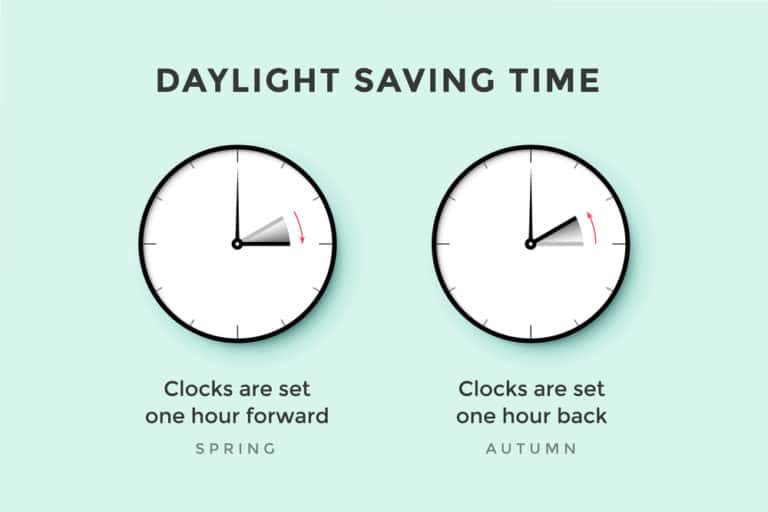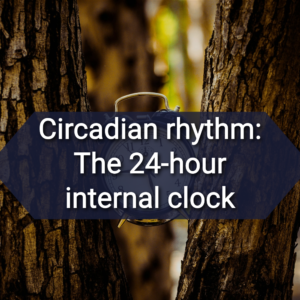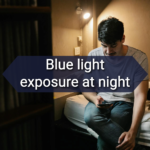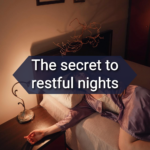One common problem many faces when Daylight Saving Time (DST) transitions occur is insomnia or sleep deprivation, leading to daytime sleepiness.
This is because your sleep schedule is disrupted when the time shifts one hour, causing you to sleep an hour earlier or later than usual.
This will naturally cause problems getting up in the morning as your internal body clock (a.k.a circadian rhythm) is accustomed to waking up at a fixed time, no matter if it’s standard time or daylight savings time.
Being sleep-deprived affects focus and can even lead to fatal traffic accidents in severe cases.
Adjusting to daylight savings time can be a challenge, but with the help of some tips and tricks, you can make it through this time shift with no problems.
When is Daylight Savings Time (DST)?
Daylight saving time (DST) adjustments come twice a year; both are set on a Sunday morning. DST adds or reduces an hour of our clock.
On the second Sunday of March, the time “spring forward” (one less hour of sleep)
It ends on the first Sunday of November when the time “rolls back” (one extra hour of sleep).
Daylight savings sleep tips
1. Practice waking up early
One of the most effective tips is setting your alarm clock by one hour a week before DST starts.
By preparing this way, you will wake up an hour earlier than usual and give yourself more time in the morning before work, one of the many benefits of waking up early.
When daylight saving time starts, you will still get up at the same time as usual. As a result, this will be an easy transition.
If you’re not in the habit of waking up early, getting used to it will take some time. The best way to do it is by gradually adjusting your sleeping schedule by increments of 15 minutes.
The goal is to wake up a bit earlier than usual every day until you reach the hour ahead.
2. Reduce caffeine usage
Caffeine stimulates your body to make you feel more awake. It works by blocking your adenosine receptors, which triggers sleepiness. A common caffeine source is a cup of coffee or tea.
There are other caffeinated drinks, such as energy drinks and sodas. It’s best to limit your caffeine intake to at least six hours before sleeping.
This is because caffeine can also prevent or reduce the time spent in deep sleep, making you feel groggy and tired even after eight hours of sleep.
3. Wake up to natural sunlight
Make use of sunlight or bright lights during the day, whether it’s from a window, night light, or a sunrise alarm clock, to help your body adjust faster to DST.
Your body’s circadian rhythm will be reset by exposing yourself to natural light in the morning, and your sleep cycle will naturally adapt to daylight savings time.
On the other hand, too much light in the evening can make it harder to sleep as your body will mistake this for daytime and delay or interrupt your sleep schedule.
Limiting your exposure to bright lights is best, especially within 2 hours of sleep.
4. Reduce light exposure while sleeping
While sleeping during daylight savings time, ensure no light seeps through your window or curtains.
Any amount of light may interfere with your body’s biological clock and can cause problems adjusting to DST.
This is particularly important during the end of the year when the sun rises early in the morning.
If waking up with the sunrise is too early for you, use blackout curtains to darken your room, so you can get a full night’s sleep without waking up to bright light.
If installing new curtains is not an option (for example, if you’re living in a rental home), you may consider wearing a sleeping eye mask. Although, some people have a hard time keeping them on while sleeping.
5. Use sleep medicine and supplements
If you tried the natural methods and still have trouble adjusting to daylight saving time, you can use oral sleep supplements to help.
Because we don’t recommend it unless necessary, it’s best to consult a sleep specialist to pinpoint if you are sleep deprived because of any sleep disorders.
Start with natural sleep supplements first, as these can help you without negative side effects from strong medicine.
Sleep supplements such as melatonin can help ease your internal clock to daylight saving time by regulating the sleep-wake cycle.
As an alternative, prescription medications may work, but they often come with a long list of side effects that can affect your health.
6. Avoid napping during the day
Napping can be great for a quick energy boost when feeling groggy.
A short nap should not affect your ability to fall asleep, but oversleeping or long naps will worsen insomnia.
Ironically, too much sleep may lead you to lack sleep.
Try reducing nap time before DST so you can fall asleep more easily at night.
Final Thoughts
The extra hour from daylight saving time messes with our sleep cycle and circadian rhythms, making it hard to sleep and stay asleep at night.
This is why adjusting to daylight saving time is important as soon as possible. By following our tips above, you will identify the problems and adapt accordingly.
On the other hand, if you find that adjusting is still difficult for you to even with these tips, or maybe you’re suffering from problems like sleep apnea, or insomnia, it’s best to seek medical attention.
Daylight Savings Time FAQ
1. How long does it take to adjust to daylight savings time?
It usually takes about a week to adjust to daylight savings time, but it depends on the individual.
2. Can daylight savings time affect your mood?
Yes. The time change can affect your mood and leave you groggy during the day, especially in the evenings or at night.
3. Can daylight savings cause insomnia?
Yes. The time change can cause insomnia that makes you more tired and stressed, leading to a bad mood or depression.
CONTINUE READING: Sleeping With The Lights On: Is It Bad For You?











